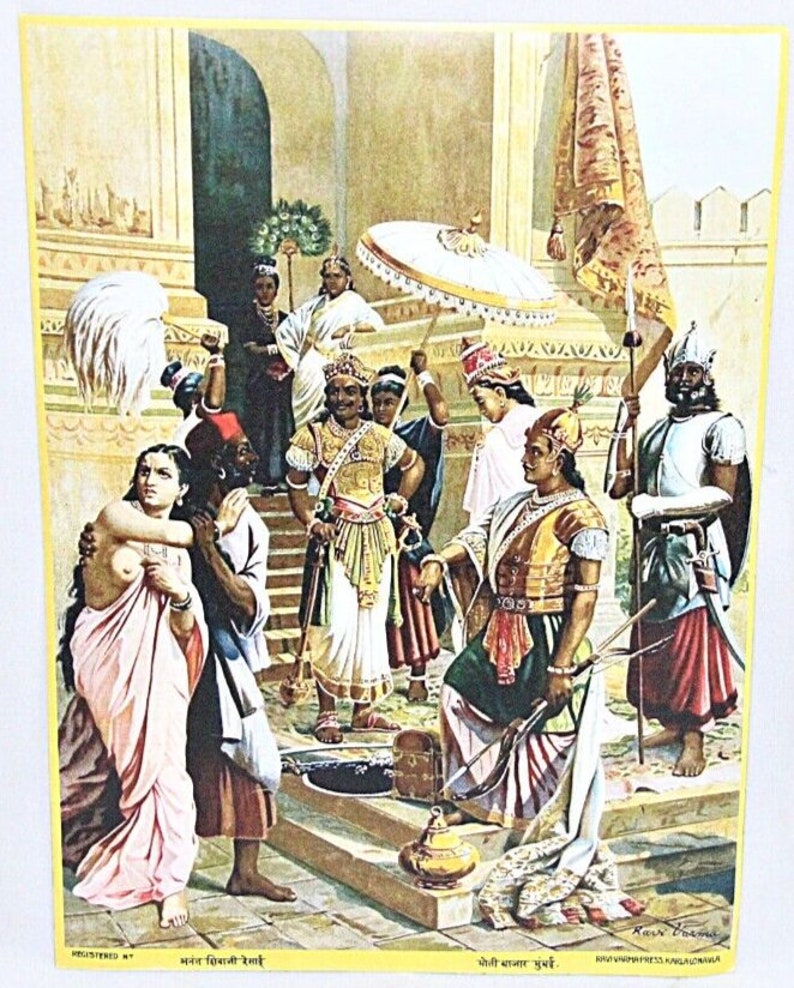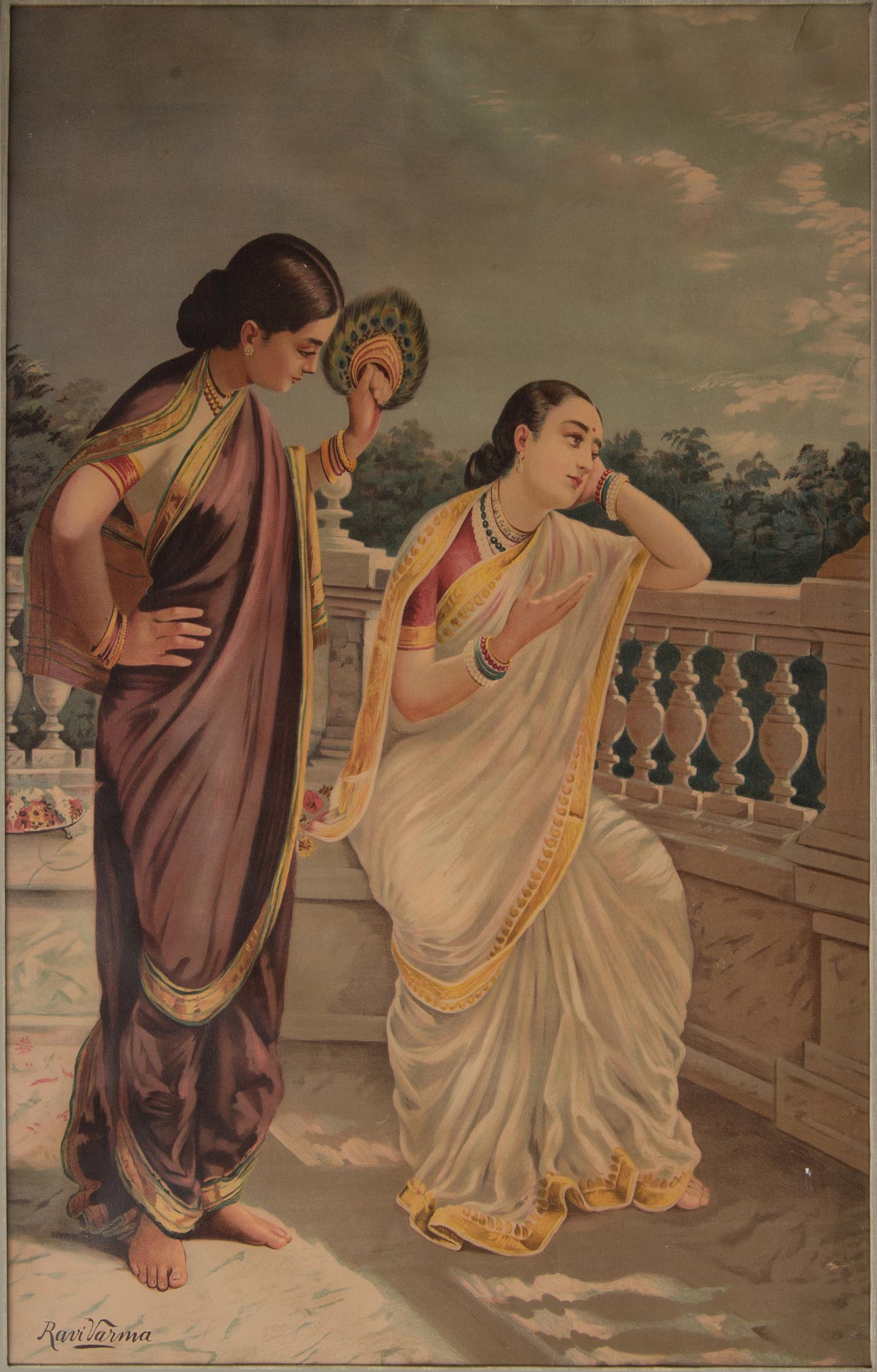Raja Ravi Varma, one of India's best-known painters, is known for his ability to blend European academic art and Indian aesthetics. His work is notable for its technical expertise, rich details, and cultural significance. His portrayals of Hindu deities, mythological themes and other subjects earned him fame. His work continues to influence Indian culture and art. Each of his top paintings is a masterpiece, and reflects his unique contribution in Indian art.
Here we take a look at the top 10 best paintings of Raja Ravi Varma.
1. Shakuntala
Shakuntala, one of Varma's best-known works, depicts the Mahabharata character in a moment filled with romantic longing. Shakuntala pretends to remove a thorn while looking subtly back at King Dushyanta, her lover. Varma's ability to convey emotion and narrative using composition and expression is evident in this painting. The lush background landscape adds to this idyllic scene, while the realistic renderings of Shakuntala’s delicate features demonstrate Varma’s mastery of academic realist painting.
2. The Galaxy of Musicians
This painting depicts a group women from India's different regions, each of whom is playing a musical instruments. The women in this painting are dressed in traditional Indian attire to represent the diversity of Indian cultures. Varma has paid meticulous attention to the cultural accuracy of his composition, which is a celebration of India's rich musical heritage. The intricate details of the fabrics, jewelry and instruments are a testament to Varma's dedication. The painting highlights Indian women's beauty and the rich classical music tradition in the country.
3. Damayanti & the Swan
In this painting Varma illustrates Damayanti, a character from the Mahabharata who is speaking with a Swan sent by King Nala, her lover. The swan is a messenger between them. The composition highlights Damayanti's elegance and grace, while the natural surroundings add a sense serenity and harmony. The swan with its connotations of love and purity plays a key role in the story. Varma's attention towards the delicate interplay of the characters enhances the emotional depth.
4. Lady in the Moonlight
This painting captures a woman's serene beauty, sitting in moonlight and surrounded by a ethereal glow. Varma uses light to create a romantic, soft atmosphere that emphasizes the woman's flowing clothes and delicate features. The simplicity of this scene contrasts with its emotional complexity, conveying a feeling of quiet contemplation. This work shows Varma's mastery in chiaroscuro, a technique that he learned through European academic art.
5. The Victory of Indrajit

Image Courtesy: https://www.etsy.com/in-en/listing/1713692165/indian-mythology-character-hindu-raja
Description : The dynamic depiction of "Victory Of Indrajit", a key scene in the Ramayana, is called "Victory Of Indrajit". Indrajit is shown in battle with a weapon of serpents that he just used to defeat his enemy. Detail is given to the dramatic composition of the painting and the intense action, including the musculature and armor designs. Varma has a unique ability to portray epic scenes that are both grand and clear, while blending mythology and realism.
6. Saraswati

Saraswati is the Hindu goddess of music, knowledge and the arts. She is shown in this painting with grace and poise. Varma depicts her sitting on a lotus with a veena in her hand, symbolizing the role of her as patroness for the arts. The serene and calm expression of her face conveys divine wisdom. Her white sari's flowing, soft drapery emphasizes her intellect and purity. Natural elements such as lotus and the swan are full of symbolism. They enhance the spiritual undertones in the painting.
7. Jatayu Vadh

Image Courtesy: https://en.m.wikipedia.org/wiki/File:Raja_Ravi_Varma,_Jatayu_vadha,_1906.jpg
This powerful painting, "Jatayu vadh", depicts the tragic moment when the noble bird Jatayu was mortally injured while trying to save Sita from Ravana. The painting captures all the emotion and drama of the moment. Jatayu lies wounded on the floor as Ravana drags Sita off in his chariot. Varma's ability to depict complex emotions and dynamic scenes is evident in the sorrow in Jatayu’s eyes, and in Ravana’s face. This painting shows Varma's ability to portray the moral dilemmas that the characters face in the epic.
8. Here Comes Papa
This painting offers a glimpse of domestic life, a departure from Varma's mythological themes. "There Comes Papa", depicts a woman holding her baby as she looks lovingly towards the entrance in anticipation of her husband's arrival. The composition is intimate. The woman's smile and child's innocent look capture the tenderness of this moment. The room's play of light, shadow and warmth adds depth and warmth to the scene. This shows Varma's versatility when it comes to handling mythological subjects as well as everyday life.
9. Hamsa Damayanti

Image Courtesy: https://www.artisera.com/products/damayanti-1
This painting depicts Damayanti in a moment of reflection. It is an excellent example of Varma’s ability to portray romantic longing and idealized beautification. This work depicts Damayanti in a moment when she is introspective, with Hamsa (the swan) standing beside her to symbolize purity and love. The intricate details and rich colors of Damayanti’s dress contrast with the calm background, creating harmony between foreground and backdrop. This painting is praised for its depiction of feminine grace, and the delicate interplay of emotion and symbolism.
10. Krishna with His foster mother Yashoda
This painting shows the loving bond between Krishna's foster mother Yashoda and the young Krishna. Varma captures Yashoda's tender affection as she holds the mischievous Krishna, often associated with divine playfulness. The painting is full of warmth and intimacy. Krishna's cherubic figure and Yashoda’s protective embrace symbolize the deep bond between mother and son. The rich colors and intricate details of their clothing enrich the scene. Meanwhile, the pastoral backdrop reinforces Krishna's idyllic childhood in Vrindavan.
The top 10 paintings of Raja Ravi Varma show his exceptional talent in blending Indian mythology and European realism. His paintings not only capture beauty and emotion in his subjects, but also bring Indian art to the world's attention. His paintings reflect his understanding of narrative, composition and cultural symbolism. He is one of the most respected artists in Indian history. His work continues to have a profound impact on both Indian fine art and popular culture. His depictions of mythological themes and domestic scenes remain iconic.















